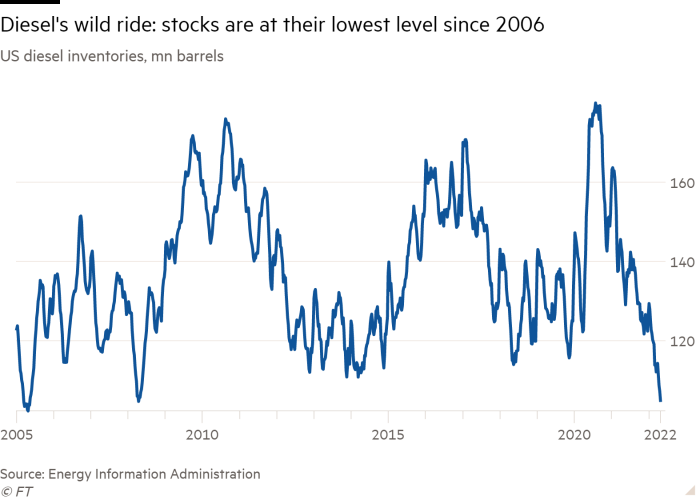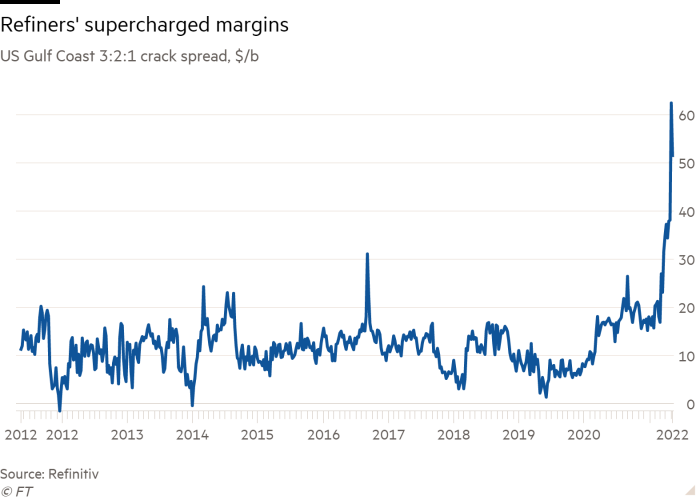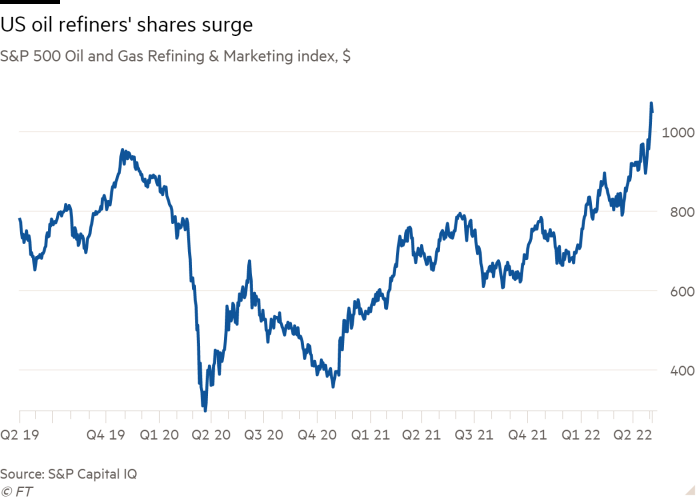One thing to start:
Ending dependence on Russian gas could cost Germany 12 per cent of its GDP.
The news from equity and bond markets has been grim, pointing to mounting fears of recession. On Monday, the bearish news hit oil and gas prices too. International benchmark Brent settled at $105.94 a barrel, down 6 per cent, and US natural gas prices — which had been ripping higher in recent weeks — also had a bad day, dropping 12 per cent to settle at $7.04 per million British thermal units. (That’s what happenswhen you write about a market rally the week before.)
In Energy Source today, Amanda Chu picks up an intriguing Environmental Defense Fund study showing that oil companies diversifying their assets to look greener are often just selling them to operators under less scrutiny. Meanwhile, as gasoline and diesel prices soar across the US, Justin Jacobs shows who is winning: refiners. They’re coining it right now.
I’ll be in Alberta next week, reporting on Canada’s energy sector. Email me if you have time to meet up: derek.brower@ft.com.
Thanks for reading.
Derek
Oil and gas M&A threaten emission reduction efforts
As oil and gas majors make new climate commitments, they’re dumping billions in dirty assets to private, less climate-friendly operators.
A new report by the Environmental Defense Fund looked at oil and gas deals over the past five years and found assets are increasingly moving away from public companies to private operators without climate commitments.
It’s a trend that raises a pressing question: when a company sells its dirty asset, is it doing anything for the climate — or is it just another greenwashing move to clean its own portfolio?
The EDF data are stark. From 2017 to 2021, more than twice as many transactions moved assets away from companies with net zero targets, flaring commitments and methane goals than the reverse.
“We’re losing disclosure, we’re losing targets, and wells are ending up in the hands of operators that have no intent to safely decommission them at the end of their life,” said Andrew Baxter, director of energy transition at EDF and one of the authors of the report.
Today’s EDF report confirms and quantifies a long-suspected problem in oil and gas asset sales. While selling assets to private companies will clean up public companies’ portfolios, it comes at the expense of weakening climate governance and risking an increase in emissions.
In the case of Shell, Total and Eni’s Umuechen oilfield sale to Trans-Niger Oil and Gas, a private operator, the report found that flaring activity increased over 700 per cent after the deal was completed, increasing carbon dioxide and methane emissions. Unlike the previous owners, Trans-Niger Oil and Gas has made no commitments to cut that pollution.
“That has real-world implications for the energy transition and all the people that live near the oil and gas wells,” said Gabriel Malek, project manager at EDF,
Eni said it did not consider asset sales to be a tool to reduce emissions. The company pointed out it was not the operator of the field, but that it was collaborating with EDF and its peers “to promote adoption of clauses related to methane emissions reduction and reporting criteria”. Eni has made commitments to reach zero flaring by 2025 as part of its strategy to achieve carbon neutrality by 2050.
“When considering divestment, Shell carries out due diligence on potential buyers to evaluate their financial health, safety record and overall operating capabilities,” said a Shell spokesperson. The company added that before a transaction closes, regulators have the final say on the buyer’s ability to safely and responsibly operate the asset and meet emissions requirements.
Oil and gas operators sell assets for many reasons, including to boost cash flows to pay for dividends and share buybacks, to pay off debts, or to raise money to spend on clean energy projects. Cleaning the portfolio is a more recent motivation.
Traditional oil and gas dealmaking may not be compatible with a net zero world, argue the EDF authors. Ensuring safeguards are in place when private operators take on assets will be important to close this transferred emissions blind spot.
To ensure climate stewardship endures beyond the deal’s completion, the authors of the report recommend rules requiring climate disclosure commitments from private buyers, applying the same emissions-reduction standards even after the asset is sold, and ensuring buyers can afford to decommission wells at the end of their life.
Data Drill
Oil markets have been jumpy this year. But if you thought things were volatile in crude, take a look at what’s been happening in fuel markets of late. Prices have gone haywire.
As I reported over the weekend, plunging inventories of diesel and other fuels — combined with strong demand, high exports and virtually no spare refining capacity — have sent fuel prices leaping higher.

Refiners are struggling to turn out enough fuel to keep up with the post-coronavirus pandemic demand surge and loss of Russian supplies.
One key indicator (warning, some industry jargon ahead): the US Gulf Coast 3:2:1 crack spread — essentially the amount a refiner gets for the fuel it sells above the price of crude it buys to make it and a sign of refiners’ profit margins — hit all-time highs of more $60 a barrel over the past week. Gasoline crack spreads are following higher to encourage refiners to start turning out more of that fuel ahead of the busy summer driving season in an inflationary fuel price spiral.

It is making for a profitable time for refiners but a costly one for consumers. The surge in refiners’ share prices tells the story. So will the price at the pump next time you go to fill up. I know I’ve noticed here in Houston that petrol prices have risen sharply over the past couple weeks even without a big jump in crude prices. (Justin Jacobs)

Power Points
-
The EU abandons plans to stop the shipping industry from carrying Russian crude.
-
UK households resort to “buy now, pay later” schemes to cover soaring energy bills.
-
Pro-business, pro-environment “teal independents” are eyeing conservative seats in Australia in a push for more climate action.
-
China’s greenbelt and road initiative still leaves lots of room for coal. (Bloomberg)
-
How Lithuania ended its dependence on Russian gas. (WaPo)











